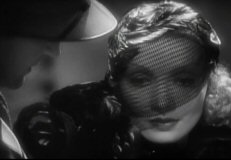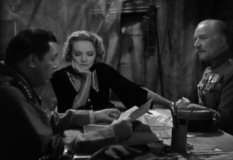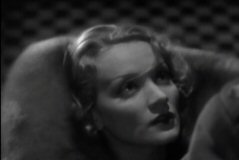Shanghai Express (Josef von Sternberg, 1932)
 Perhaps no director better understood
how to utilize the heightened artificiality that the soundstage allowed than
Josef von Sternberg. In Shanghai Express,
perhaps his most conventional film, he uses his impeccable technique to greatly
enhance what might have been in lesser hands fairly routine drama. In a Sternberg film, the sheer amount of visual information
that the director asks us to process acts as an indicator that the emotions and
motivations of the characters are never as simple as they might appear. He
layers and filters light, bending it to reflect the unspoken possibilities that
the script doesn’t articulate. In this setting, a gauzy tapestry can remove
certainty from even the most assertive monologue. In Shanghai Express, the titular train itself becomes a perfect visual
metaphor for the brand of claustrophobic compression that Sternberg specializes
in. Its windows offer a glimpse at openness that taunts its passengers. It only
moves forward along its tracks; never backward. The characters here are in a
state of arrested transition, put in a place where they are forced to contend
with both their disappointing pasts and uncertain futures, and every lavishly
adorned shot Sternberg includes comments on this emotional stasis. Before long,
the paralysis becomes literal as the train is held, forcing the resolution of
the tensions that have mounted along its journey. As the actors move through the
maze of a train, a series of sliding doors, and other improbably varied décor
they move closer to realizations that will shape their views of romantic
devotion.
Perhaps no director better understood
how to utilize the heightened artificiality that the soundstage allowed than
Josef von Sternberg. In Shanghai Express,
perhaps his most conventional film, he uses his impeccable technique to greatly
enhance what might have been in lesser hands fairly routine drama. In a Sternberg film, the sheer amount of visual information
that the director asks us to process acts as an indicator that the emotions and
motivations of the characters are never as simple as they might appear. He
layers and filters light, bending it to reflect the unspoken possibilities that
the script doesn’t articulate. In this setting, a gauzy tapestry can remove
certainty from even the most assertive monologue. In Shanghai Express, the titular train itself becomes a perfect visual
metaphor for the brand of claustrophobic compression that Sternberg specializes
in. Its windows offer a glimpse at openness that taunts its passengers. It only
moves forward along its tracks; never backward. The characters here are in a
state of arrested transition, put in a place where they are forced to contend
with both their disappointing pasts and uncertain futures, and every lavishly
adorned shot Sternberg includes comments on this emotional stasis. Before long,
the paralysis becomes literal as the train is held, forcing the resolution of
the tensions that have mounted along its journey. As the actors move through the
maze of a train, a series of sliding doors, and other improbably varied décor
they move closer to realizations that will shape their views of romantic
devotion.
 Near the start of Shanghai
Express, a stiff-lipped Englishman describes China as a place "where
time and life have no value." Sternberg does his best to make sure we feel
that atmosphere, despite the studio-bound shooting. Every image that isn’t sexualized here is at least capable
of great intrigue, as in any Sternberg film, and the exoticism offered by the
setting becomes nothing less than intoxicating as the emotional stakes are
raised. Marlene Dietrich, Sternberg’s famous muse, plays Shanghai Lily,
"the notorious white flower of China", a kept woman who's literally
known to drive men out of their minds with her wiles. Trapped on a train with an
old flame, she tests and taunts him at every turn before settling on the
realization that she still loves him. Her confusion and pain are palpable, and
dominate Shanghai Express, yet she's only one member of the terrific
ensemble assembled here.
Near the start of Shanghai
Express, a stiff-lipped Englishman describes China as a place "where
time and life have no value." Sternberg does his best to make sure we feel
that atmosphere, despite the studio-bound shooting. Every image that isn’t sexualized here is at least capable
of great intrigue, as in any Sternberg film, and the exoticism offered by the
setting becomes nothing less than intoxicating as the emotional stakes are
raised. Marlene Dietrich, Sternberg’s famous muse, plays Shanghai Lily,
"the notorious white flower of China", a kept woman who's literally
known to drive men out of their minds with her wiles. Trapped on a train with an
old flame, she tests and taunts him at every turn before settling on the
realization that she still loves him. Her confusion and pain are palpable, and
dominate Shanghai Express, yet she's only one member of the terrific
ensemble assembled here.
 Although Dietrich is clearly the
film’s object of sexual obsession, the abundance of plot details that don't
involve her might be surprising to those who have seen the other collaborations
between the actress and director. Still, the remainder of the cast seems to
exist mostly to provide a response to her surprising devotion. Her morality is
largely underestimated by a cynical world that sees romantic faith as a
foolhardy, unlikely pursuit, but before the film ends, her sacrifice is viewed
with more crowd-pleasing lightness than in Sternberg's earlier features. The
script, loaded with snappy banter and blatant innuendo, might be the funniest of
any Sternberg film, but the ending certainly feels like a change of pace for the
director. Shanghai Express’
delirious final scenes are perhaps a bit too eager to please, and are a bit out
of step with the oppressive atmosphere that the film had spent so much effort
creating. As delightful as the last scene is, contrasting it to the devastating
final sequences of Dishonored, Morocco,
or The Blue Angel (the three previous Sternberg / Dietrich
collaborations) reveals it as something of a cheat.
Although Dietrich is clearly the
film’s object of sexual obsession, the abundance of plot details that don't
involve her might be surprising to those who have seen the other collaborations
between the actress and director. Still, the remainder of the cast seems to
exist mostly to provide a response to her surprising devotion. Her morality is
largely underestimated by a cynical world that sees romantic faith as a
foolhardy, unlikely pursuit, but before the film ends, her sacrifice is viewed
with more crowd-pleasing lightness than in Sternberg's earlier features. The
script, loaded with snappy banter and blatant innuendo, might be the funniest of
any Sternberg film, but the ending certainly feels like a change of pace for the
director. Shanghai Express’
delirious final scenes are perhaps a bit too eager to please, and are a bit out
of step with the oppressive atmosphere that the film had spent so much effort
creating. As delightful as the last scene is, contrasting it to the devastating
final sequences of Dishonored, Morocco,
or The Blue Angel (the three previous Sternberg / Dietrich
collaborations) reveals it as something of a cheat.
71
Jeremy Heilman
11-19-04